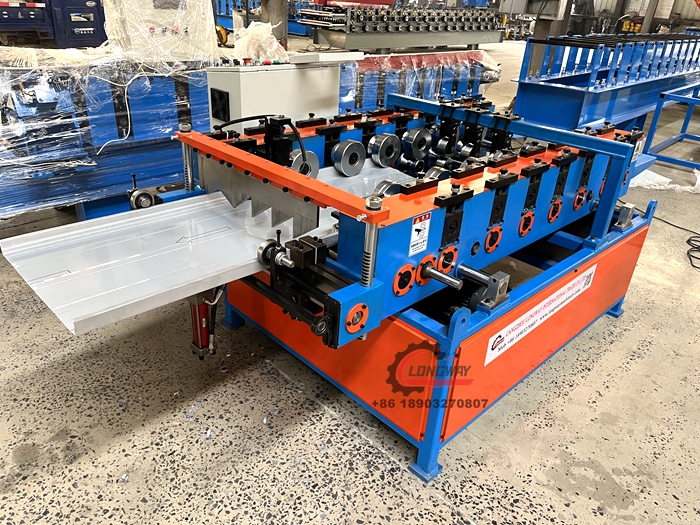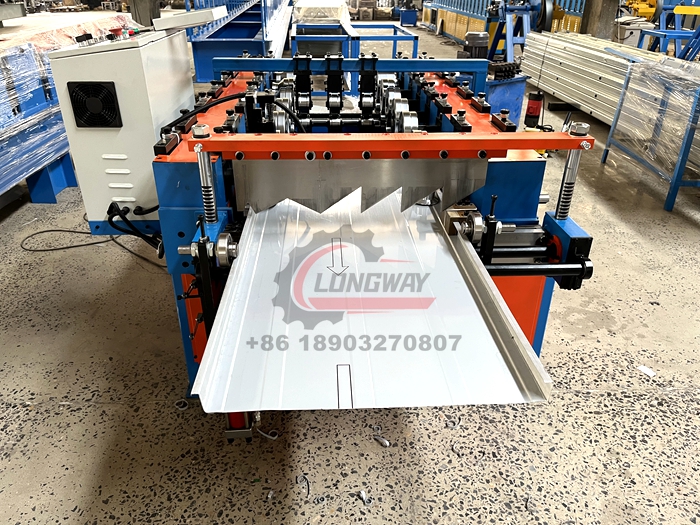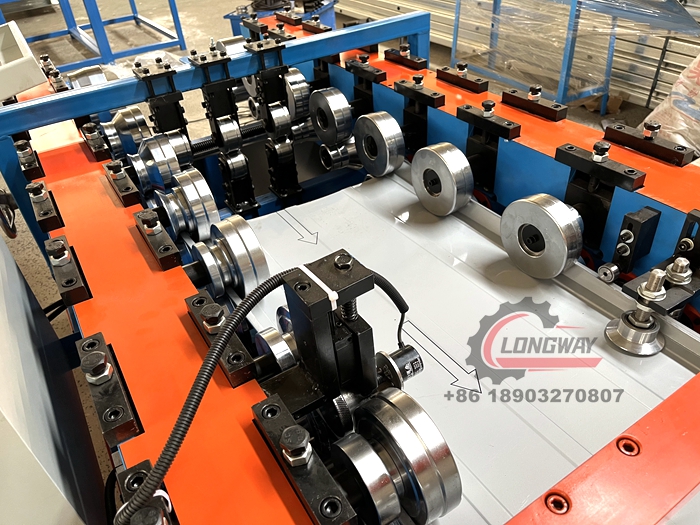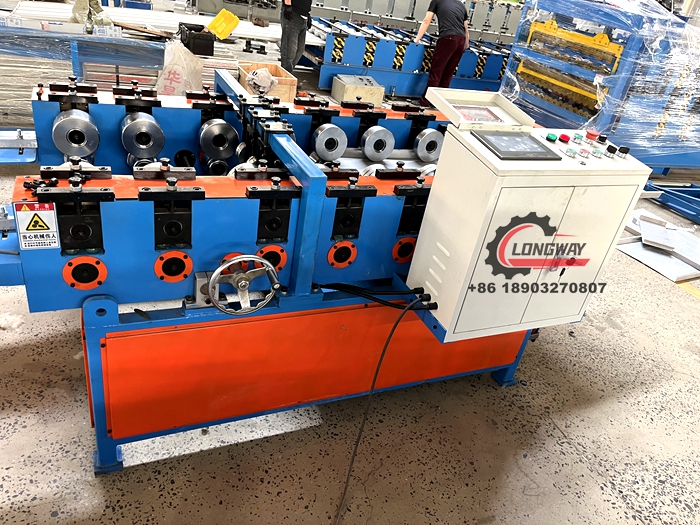Portable Standing Seam Roof Panel Roll Forming Machine | On-site & Efficient
Introduction to Advanced Portable Standing Seam Roll Forming Technology
In modern construction, efficiency, adaptability, and precision are paramount. The demand for on-site fabrication of roofing panels has surged, driven by complex architectural designs, logistical challenges, and the need to minimize material waste. Central to meeting these demands is the Portable Standing seam roof panel roll forming machine. This advanced equipment empowers contractors and manufacturers to produce high-quality standing seam roof panels directly at the job site, offering unparalleled flexibility and cost-effectiveness for projects ranging from commercial facilities to intricate architectural structures. Its robust design and sophisticated control systems ensure consistent profile accuracy and material integrity, crucial for durable and aesthetically pleasing roofing solutions.

Industry Trends and Market Dynamics
The global construction industry is experiencing dynamic shifts, with a growing emphasis on sustainable building practices, accelerated project timelines, and enhanced structural integrity. Standing seam roofing, known for its superior weather resistance, longevity, and aesthetic appeal, is increasingly becoming the preferred choice for commercial, industrial, and institutional buildings. Key trends driving the adoption of Portable Standing seam roof panel roll forming machine technology include:
- On-Site Fabrication Demand: Minimizing transportation costs, reducing material damage during transit, and enabling production of custom panel lengths directly on location.
- Sustainability Focus: Reduced waste from off-site manufacturing and optimized material usage due to precise length cutting.
- Labor Efficiency: Automated processes require fewer manual laborers, addressing skilled labor shortages in construction.
- Architectural Flexibility: Ability to produce complex profiles and tapering panels to meet unique design specifications.
- Durability and Performance: Standing seam roofs offer exceptional longevity, corrosion resistance, and thermal efficiency, aligning with long-term investment strategies.
According to recent market analysis, the global metal roofing market is projected to reach over $20 billion by 2027, with standing seam systems holding a significant share due to their increasing popularity in both new construction and renovation projects. This growth directly fuels the demand for efficient, reliable, and portable roll forming solutions.
Detailed Process Flow of the Portable Standing Seam Roll Forming Machine
The operation of a Portable Standing seam roof panel roll forming machine involves a meticulously engineered sequence of steps to transform raw metal coils into finished standing seam panels. Understanding this process is crucial for optimizing production and ensuring product quality.
Materials and Preparation:
The primary materials utilized are typically galvanized steel, Alu-Zinc coated steel, or pre-painted steel coils. These coils are selected for their durability, corrosion resistance, and aesthetic properties. Material thicknesses commonly range from 0.5mm to 1.2mm, depending on structural requirements and panel profiles. Critical material properties, such as yield strength and tensile strength, are carefully considered to ensure optimal forming without material stress or fracturing. All incoming coils are subjected to material certification verification to meet industry standards (e.g., ASTM A653 for galvanized steel).
Manufacturing Process Steps:
- Coil Loading and Decoiling: The metal coil is loaded onto a decoiler, which precisely unwinds the coil at a controlled speed. Modern machines often feature hydraulic or motorized decoilers for efficient material handling, ensuring a smooth, consistent feed into the machine.
- Guiding and Leveling: The uncoiled strip passes through a guiding system to ensure perfect alignment and then enters a leveling section. This process removes any coil set or curvature, preparing a flat strip for the subsequent roll forming.
- Roll Forming Stations: This is the core of the process. The flat metal strip progresses through a series of precision-engineered rollers (forming stations). Each station progressively shapes the material, incrementally forming the standing seam profile. The rollers themselves are typically forged from high-grade tool steel (e.g., Cr12, 45# steel), heat-treated for superior hardness (HRC 58-62) and wear resistance, and often precision-machined using CNC technology to achieve tight tolerances.
- Cutting to Length (Post-Cut/Pre-Cut): Once the desired profile is formed, a cutting mechanism (hydraulic or electric shear) cuts the continuous panel to the specified length. High-accuracy encoders and PLC-controlled systems ensure precise cuts, minimizing material waste. Some advanced machines feature a "pre-shear" for lead-in and "post-cut" for finished panels, optimizing material usage.
- Output and Stacking: The finished panels are then conveyed out of the machine and stacked, ready for installation. Automated stacking systems can further enhance efficiency, especially for long production runs.
Quality Control and Testing Standards:
Throughout the manufacturing process of the machine itself, and during its operational output, stringent quality control measures are implemented. Machine components undergo rigorous inspection, including dimensional accuracy checks via CMM (Coordinate Measuring Machine) and hardness testing of critical parts. Finished machines are typically tested against ISO 9001 quality management standards and often carry CE certification, ensuring compliance with European safety, health, and environmental protection requirements. Operational tests include profile accuracy (within ±0.5mm tolerance), panel length consistency (within ±2mm), and forming speed validation.
Service Life and Target Industries:
A well-maintained Portable Standing seam roof panel roll forming machine is engineered for a service life exceeding 15-20 years, a testament to its robust construction and high-quality components. These machines find extensive application across various industries, including:
- Commercial Construction: Retail centers, office buildings, warehouses.
- Industrial Facilities: Manufacturing plants, power generation stations, petrochemical complexes.
- Logistics & Distribution: Large-span storage and distribution centers.
- Public Infrastructure: Airports, sports arenas, educational institutions.
- Agriculture: Large barns, storage facilities, and processing plants.
In these scenarios, the advantages are clear: energy saving through superior panel sealing, enhanced corrosion resistance from high-quality materials and precise panel formation, and significantly reduced installation times due to on-site production of custom-length, perfectly formed panels.
Technical Specifications and Parameters
Understanding the detailed technical specifications of a Portable Standing seam roof panel roll forming machine is essential for procurement and operational planning. The following table outlines typical parameters for a high-performance model:
| Parameter | Specification |
|---|---|
| Material Thickness Range | 0.5 - 1.2 mm |
| Applicable Materials | Galvanized Steel, Alu-Zinc, Pre-painted Coils, Aluminum |
| Coil Width | 600 mm - 1250 mm (adjustable) |
| Forming Speed | Up to 15-20 meters/minute (adjustable) |
| Forming Stations | 15-22 stations (depending on profile complexity) |
| Main Motor Power | 7.5 - 11 kW |
| Hydraulic Power for Cutting | 4 - 5.5 kW |
| Cutting Tolerance | ± 2 mm |
| Control System | PLC (e.g., Siemens, Panasonic) with Touch Screen HMI |
| Machine Dimensions (L x W x H) | Approx. 7.5m x 1.5m x 1.3m (without decoiler) |
| Machine Weight | Approx. 5,000 - 7,000 kg |
| Power Supply | 380V/50Hz/3Phase (customizable) |
These specifications highlight the machine's capability to handle a wide range of materials and profiles, delivering high-speed, precise output suitable for demanding construction schedules.

Technical Advantages and Performance Benefits
The inherent design and engineering of a modern Portable Standing seam roof panel roll forming machine provide a multitude of technical advantages that translate directly into operational efficiencies and project successes:
- Superior Portability: Designed for easy transport and rapid setup on diverse job sites, minimizing downtime. Integrated leveling legs and robust chassis ensure stability on uneven terrain.
- High Precision Forming: Utilizes advanced CNC-machined rollers and precision bearings to maintain panel profile accuracy, ensuring tight seams and structural integrity. Finite Element Analysis (FEA) is often employed in roller design to prevent material deformation.
- Versatile Material Handling: Capable of processing various metal types and thicknesses, including pre-painted coils, without scratching or damaging the surface finish, thanks to optimized roller design and material guides.
- Advanced Control Systems: PLC-based control with intuitive Human-Machine Interface (HMI) touchscreens allows for easy programming of panel lengths, batch sizes, and speed adjustments, enhancing operational control and reducing operator error.
- Robust Construction: Frame typically constructed from high-strength structural steel, precisely welded and stress-relieved to ensure long-term stability and vibration dampening during high-speed operation. Critical components like shafts are hardened and ground for maximum durability.
- Energy Efficiency: Optimized motor and hydraulic systems reduce power consumption, contributing to lower operating costs and a smaller environmental footprint.
- Minimized Waste: On-site production eliminates off-cut waste from transportation and reduces the risk of panel damage, leading to significant material cost savings.
These technical facets combine to deliver a powerful solution for modern roofing projects, ensuring high-quality output, operational flexibility, and long-term cost benefits.
Application Scenarios and Experience
The versatility of the Portable Standing seam roof panel roll forming machine makes it indispensable across a spectrum of construction environments. Its ability to perform on-site panel fabrication significantly streamlines project logistics and execution.
- Remote Construction Sites: For projects in geographically challenging or remote locations, transporting pre-fabricated long panels can be prohibitive. On-site forming eliminates this challenge, enabling high-quality roofing even in isolated areas.
- Large-Scale Industrial Buildings: Warehouses, factories, and distribution centers often require very long, continuous panels to minimize seams and enhance weatherproofing. The machine can produce panels of virtually any length, limited only by coil availability and transportation of the finished product.
- Complex Architectural Designs: Projects requiring tapered panels, curved panels (with additional machinery), or multiple profile variations benefit immensely from the customization capabilities of on-site roll forming.
- Time-Sensitive Projects: The rapid production capability and reduced lead times for material delivery contribute significantly to accelerating project completion, critical for fast-track construction.
- Retrofit and Renovation Projects: Matching existing profiles or creating bespoke panels for renovation work becomes highly efficient. Customer feedback consistently highlights the reduction in project delays and improved material handling safety due to on-site production.
One notable example involved a large logistics hub in the Middle East. Facing extreme heat and logistical bottlenecks, the contractor deployed a portable roll former. This allowed for immediate production of custom-length panels up to 60 meters, reducing installation time by 30% and eliminating panel damage during transport, which was a significant concern given the vast site area.

Vendor Comparison: Evaluating Portable Roll Forming Solutions
When investing in a Portable Standing seam roof panel roll forming machine, a thorough vendor comparison is crucial. Key differentiators often include machine robustness, control system sophistication, post-sales support, and customization options. Below is a comparative overview, contrasting a high-tier solution with typical market offerings.
| Feature | Premium Supplier (e.g., LW Roll Forming) | Standard Market Offering |
|---|---|---|
| Roller Material & Hardness | Cr12 / GCr15 with quenching treatment (HRC 58-62) | 45# Steel (HRC 50-55) |
| Control System | Siemens/Panasonic PLC with 7-10" Touch HMI | Basic PLC with push-button controls or smaller HMI |
| Drive System | Chain/Gearbox drive with AC motor and inverter for speed control | Direct chain drive (less precise control) |
| Cutting Mechanism | High-precision Hydraulic post-cut with encoder | Electric shear or less precise hydraulic cut |
| Frame Structure | Robust welded H-beam/channel steel, stress-relieved | Standard welded channel steel, potential for vibration |
| Forming Speed (Avg.) | 15-20 m/min | 8-12 m/min |
| Customization Options | Extensive (multiple profiles, varying coil widths, specific PLC brands) | Limited to standard profiles and configurations |
| After-Sales Support | Global presence, 24/7 technical support, on-site commissioning | Regional or limited online support |
The difference in component quality, control systems, and support directly impacts the machine's longevity, operational efficiency, and the quality of the final product. Investing in a premium machine from a reputable manufacturer ensures higher ROI through reduced maintenance, superior output, and extended service life.
Customized Solutions and Flexibility
Recognizing that no two construction projects are identical, leading manufacturers offer extensive customization options for the Portable Standing seam roof panel roll forming machine. This ensures that the equipment perfectly aligns with specific project requirements and operational workflows.
- Profile Adaptation: Manufacturers can design and fabricate custom roller sets to produce unique standing seam profiles, including varying seam heights, panel widths, and architectural aesthetics.
- Material Compatibility: Optimization for specific material types beyond standard steel, such as copper, zinc, or specialized alloys, by adjusting roller materials, surface treatments, and forming pressures.
- Automation Level: Integration of advanced automation features like automatic coil feeding, robotic stacking systems, or remote diagnostic capabilities for enhanced efficiency and reduced manual labor.
- Power and Portability: Custom power supply configurations to match local grid standards (e.g., 220V, 480V, 60Hz) and options for enhanced mobility, such as trailer-mounted designs or lighter chassis for specific transport needs.
- Environmental Adaptations: Special coatings or enclosed designs for operation in harsh environments (e.g., extreme temperatures, high humidity, corrosive atmospheres).
These tailored solutions underscore the commitment to providing not just a machine, but a comprehensive, adaptable manufacturing asset for complex B2B applications.
Application Case Studies and Success Stories
Real-world deployments demonstrate the tangible benefits of utilizing a advanced portable roll former.
Case Study 1: Large-Scale Automotive Manufacturing Plant
- Challenge: Roofing a new 150,000 sq meter facility with minimum seams and a strict deadline. Sourcing pre-fabricated panels of necessary lengths (up to 40m) was logistically complex and expensive.
- Solution: Deployment of a high-speed Portable Standing seam roof panel roll forming machine on-site. The machine was operated by a two-person team per shift.
- Results: Over 100,000 linear meters of panels were produced in 8 weeks, significantly ahead of schedule. Material waste was less than 1%, and the seamless panels drastically reduced leak points, enhancing the long-term integrity of the roof. The total project cost for roofing was reduced by 12% compared to off-site fabrication.
Case Study 2: Remote Hydroelectric Power Station Upgrade
- Challenge: Replacing the roof of a critical power station located in a mountainous region. Access roads were narrow, making transport of long panels extremely difficult and risky. High wind loads necessitated robust standing seam panels.
- Solution: A trailer-mounted portable roll former was transported to the site. Coil delivery was managed in smaller, more manageable units.
- Results: The machine produced custom 25-meter panels directly adjacent to the power station. This avoided complex overland transport logistics and allowed for immediate installation. The project was completed on time, and the quality of the on-site formed panels met the stringent wind uplift requirements for the region.

Trustworthiness and Support: FAQ, Lead Time, Warranty & After-Sales
Frequently Asked Questions (FAQ)
- Q: What is the typical lead time for a Portable Standing seam roof panel roll forming machine?
A: Standard models typically have a lead time of 45-60 working days from order confirmation to shipment. Custom configurations may extend this to 75-90 days, depending on the complexity of design and component sourcing. - Q: What kind of power supply is required for the machine?
A: Most machines are designed for 380V/50Hz/3-phase power. However, we offer customization options for various international voltage and frequency standards (e.g., 220V/60Hz, 480V/60Hz). - Q: Can the machine produce multiple panel profiles?
A: While a single machine is typically configured for one specific standing seam profile, some advanced models offer quick-change cassette systems or interchangeable roller sets to produce 2-3 common profiles. Fully customizable roller sets for bespoke profiles are also available. - Q: How portable is the machine, really? Can it be towed on roads?
A: Our machines are designed with portability in mind. While some larger models are typically transported via flatbed truck, trailer-mounted versions are available for direct towing to job sites, complete with road-legal features (lights, brakes, etc.) where required by local regulations.
Lead Time and Fulfillment
We maintain a streamlined manufacturing and logistics process to ensure timely delivery. Upon order confirmation and receipt of deposit, a detailed production schedule is provided. Pre-shipment inspections and comprehensive factory acceptance tests (FAT) are conducted and documented to ensure every machine meets our rigorous quality standards before dispatch. We work with trusted logistics partners for global shipping, offering DDP, CIF, and FOB terms.
Warranty Commitments
All our Portable Standing seam roof panel roll forming machine units come with a comprehensive warranty:
- 24-Month Warranty for Main Components: Covers main motor, PLC, hydraulic pump, and critical electrical components.
- 60-Month Warranty for Structural Frame: Covers the main machine frame against manufacturing defects.
- Wear parts (e.g., cutting blades) are excluded, but replacements are readily available. Our warranty reflects our confidence in the durability and reliability of our engineering.
Customer Support and After-Sales Service
We are committed to providing unparalleled after-sales support to ensure continuous, optimal performance of your equipment. Our support package includes:
- 24/7 Technical Assistance: Via phone, email, and live chat with our experienced engineering team.
- Remote Diagnostics: For advanced models with internet connectivity, allowing quick troubleshooting and software updates.
- On-Site Installation and Training: Our technicians can travel globally for commissioning, setup, and comprehensive operator training.
- Spare Parts Availability: A complete inventory of spare parts for rapid dispatch, minimizing potential downtime.
- Lifetime Technical Support: Beyond the warranty period, we remain available for consultation and support.
Our dedication to customer satisfaction and continuous operation is a cornerstone of our business, ensuring that your investment delivers maximum value over its entire lifecycle.
Conclusion
The Portable Standing seam roof panel roll forming machine represents a critical asset for modern construction. Its blend of portability, precision, and efficiency empowers B2B clients to meet stringent project demands, reduce operational costs, and deliver superior roofing solutions. By embracing advanced technology, ensuring robust engineering, and offering comprehensive support, manufacturers are providing tools that are not just machines, but pivotal partners in architectural and industrial development.
References
- Smith, J. (2022). "Advances in On-Site Metal Panel Fabrication for Sustainable Construction." Journal of Architectural Engineering, 28(3), 04022018.
- Wang, L., & Chen, H. (2021). "Impact of Portable Roll Forming Technology on Construction Project Logistics and Material Waste Reduction." International Journal of Construction Management, 21(5), 498-507.
- Global Market Insights. (2023). "Metal Roofing Market Size, Share & Trends Analysis Report."
- ISO 9001:2015 Quality management systems — Requirements. International Organization for Standardization.
-
Corrugated iron roofing sheet making machine with CE, AutoNewsNov.17, 2025
-
3mm Steel C U Channel Roll Forming Machine, Heavy DutyNewsNov.17, 2025
-
Calamima Micro Ondulada corrugated roof sheet machine - CNCNewsNov.17, 2025
-
Metal Roofing Roll Former for Sale Companies - Fast, PreciseNewsNov.17, 2025
-
Drywall Steel L Angle Bar forming machine | Fast, PreciseNewsNov.17, 2025
-
Corrugated Iron Roofing Sheet Making Machine, Fast & DurableNewsNov.11, 2025
-
Corrugated Metal Roofing Machine | High-Speed, Precise, CENewsNov.11, 2025







